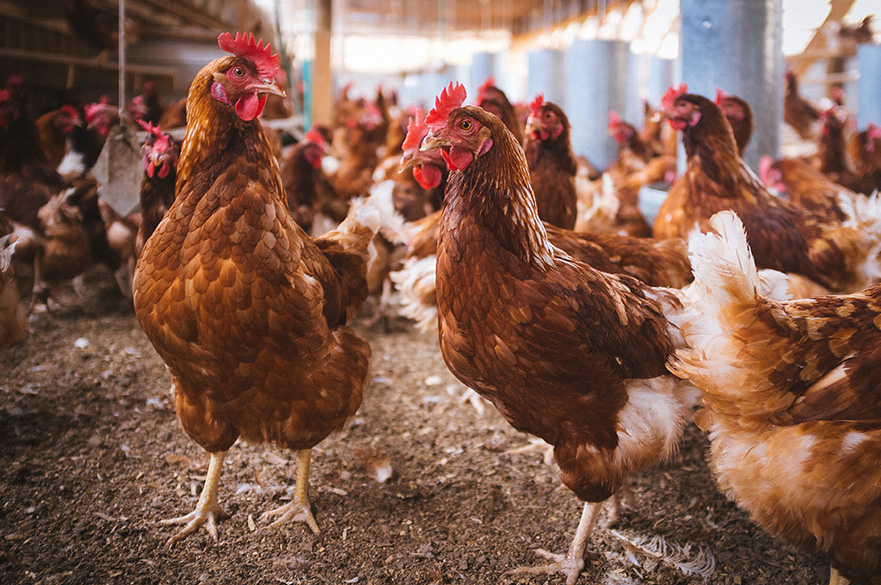Overview
An exciting opportunity has arisen through a 3.5 year, fully funded PhD studentship jointly funded by Kemin Europa and the Perry Foundation; primarily based at the Nottingham Trent University’s Brackenhurst Campus. The sustainable food production team at NTU is a well-established, vibrant research group with superb poultry and lab facilities and immense technical and academic expertise in poultry nutrition and health. We have been commended by Research Councils UK for the pipeline of high calibre scientists emerging from our group.
The annual EU+ importation of 14 million tonnes of soy as a protein source for animal feed from N and S America is creating a global imbalance in nitrogen flow and contributing to deforestation. However, locally produced protein sources are less digestible for poultry and so, currently, are not economically and environmentally attractive options. The capacity of modern poultry strains to adapt their gastro-intestinal tract to non-soya, low carbon protein sources is low, so development of dietary interventions to support adaptation of more environmentally sound diets is now urgently necessary in order to switch from reliance on imported soya to use of local protein crops.
Global ingredient manufacturer, Kemin, are currently using their industrial fermentation expertise to develop protease enzymes designed increase the rate of protein digestion in non-ruminant livestock in order to increase efficiency of protein utilisation in animal feed. To date, the pipeline has focused on the current protein source, soybean meal but the increasing concerns over the economic vulnerability and environment impact of European soy importation suggests use of locally produced ingredients. The Perry Foundation is a registered UK Charity with the objectives of promoting education and research connected with agriculture or food production for the benefit of the public.
The aim of this project is to develop enzymatic approaches to increase the inclusion of UK protein crops in poultry production and quantify the effect on environmental impact at key points in the production chain.
The project will focus on three UK protein crops: field peas, faba beans and lupins. Field peas and beans are becoming common protein crops in the UK and are used for both human consumption and animal feed as a source of protein and energy but peas contain trypsin inhibitors and other proteinaceous anti-nutritional factors which must be de-natured before they can be used in large volumes on poultry diets. Lupins are less common compared to peas and beans but are gaining interest for animal feed but also contains antinutritional factors that must be reduced before they can be adopted as a mainstream protein source for meat poultry.
The overarching aim of the project will be met through addressing 5 objectives: 1 -Quantify the variability in antinutritional factor levels across pea, faba bean and lupin samples; 2: Determine effect of a range of enzyme application levels on nutrient digestibility in broilers trials for common profiles of pea, lupin and faba beans to pick optimum enzyme approach for each crop; 3: Assess short term (21 day) broiler growth response to individual protein sources with enzyme additive defined in objective 2 included at increasing rates of inclusion; 4: Determine the feed conversion ratio and carbon footprint per kg meat in diets formulated to displace soya with the combinations indicated from objectives 2 and 3 and 5: Conduct predictive modelling for life cycle analysis and 5 year environmental impact assessment for individual protein crop growers to quantify the impact of increased inclusion of protein crops within the rotation.
The PhD programme will allow the applicant to experience a wide range of established and emerging techniques that underpin research in animal production and develop their practical skills in a supportive environment. The work will provide much scope for independence, publication and attendance at scientific conferences and would be expected to lead to high impact outputs.
Staff profiles
Entry qualifications
To be eligible to apply, you must hold an MSc or BSc Hons (2:1 or above) in a relevant discipline and also must be classed as a UK Home student. Applicants should outline in the application form how their skills, attributes and discipline knowledge will help them to achieve the objectives outlined in the research proposal document. The ability to drive in the UK would be advantageous in this studentship to maximise opportunities for engagement with the industrial sponsor. For informal discussions, please contact Emily.burton@ntu.ac.uk
How to apply
Please see our applications page for guidance and eligibility criteria.
Applications close Monday 10 February 2025.
Fees and funding
This is a fully funded PhD studentship opportunity, open for UK applicants.
Guidance and support
Find out about guidance and support for PhD students.
